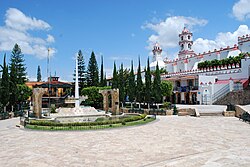Ixtapan
| Ixtapan de la Sal | |
|---|---|
| Town & Municipality | |

Main plaza with church
|
|
| Coordinates: 18°50′00″N 99°41′00″W / 18.83333°N 99.68333°W | |
| Country |
|
| State | State of Mexico |
| Municipal Status | 1822 |
| Government | |
| • Municipal President | Salvador Christopher Vergara Cruz (2006-2009) |
| Elevation (of seat) | 1,880 m (6,170 ft) |
| Population (2005) Municipality | |
| • Municipality | 30,073 |
| • Seat | 15,383 |
| Time zone | CST (UTC-6) |
| Postal code (of seat) | 51900 |
| Website | (in Spanish) http://www.edomexico.gob.mx/ixtapandelasal |
Ixtapan de la Sal is a town and municipality located in the State of Mexico, Mexico. It is 60 km south of Toluca, the state capital. The word Ixtapan comes from Nahuatl. There are two theories as to the origin of the name. The first one states that it is composed of iztal, which means salt, and pan, which means over or in. The second one states that it comes from iztac, which means white, atl, which means water; and pan, which means in white waters. "de la Sal" is Spanish for "of salt".
As of the 2005 census, the town had a population of 15,383. Two rivers pass through Ixtapan de la Sal. They are “El Rio Salado” from the east with a year-round current, and “El Rio Salitre” from the northwest with a seasonal current. Also an aqueduct passes through the city. But the most relevant part for tourists is the carbonated water of “La Laguna Verde,” a spring which filters from the subsoil sprouting naturally in form of water eruptions.
On January 22, 1981, Ixtapan de la Sal officially became a city. In 1996, it was integrated to the program of the “100 Colonial Cities”, which is a touristic program that gathers the oldest as well as the most important Mexican cities.
The city of Ixtapan de la Sal has as its primary economic activity the tourism generated by the thermal springs that are found here. It is considered to be one of the primary tourist destinations in the State of Mexico. Many internationally-known hotel chains have locations here, most often placed on or right next to a thermal spring. The best known of these hotel-spas are the famous Ixtapan Spa Hotel and Golf Resort, Marriott Ixtapan de la Sal, Hotel Rancho San Diego Grand Spa Resort, and Rey Ixtapan de la Sal. These resorts offer guests baths in volcanically-heated waters, massages, beauty treatments and other services.
It is also the home of the Parque Acuático Ixtapan, a water park with thermal spring spa, a children's area, a family area and an area dedicated to "extreme" water rides. The park also has an expanse of green area with a small train that tours it.
Fifteen kilometers to the south of the city are located the Grutas de la Estrella. These are caverns that have been formed by the dissolving of limestone by groundwater that seeps from the Chontalcuatlan and San Jeronimo rivers. These caverns are filled with stalactites and stalagmites of various colors.
...
Wikipedia
